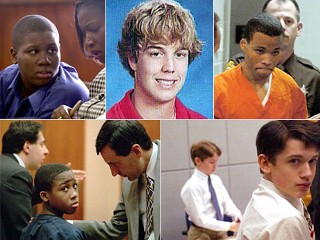High school sophomores should be ready for college by age 16. That's the message from New Hampshire education officials, who announced plans Oct. 30 for a new rigorous state board of exams to be given to 10th graders. Students who pass will be prepared to move on to the state's community or technical colleges, skipping the last two years of high school. (
See pictures of teens and how they would vote.)
Once implemented, the new battery of tests is expected to guarantee higher competency in core school subjects, lower dropout rates and free up millions of education dollars. Students may take the exams - which are modeled on existing AP or International Baccalaureate tests - as many times as they need to pass. Or those who want to go to a prestigious university may stay and finish the final two years, taking a second, more difficult set of exams senior year. "We want students who are ready to be able to move on to their higher education," says Lyonel Tracy, New Hampshire's Commissioner for Education. "And then we can focus even more attention on those kids who need more help to get there."
But can less schooling really lead to better-prepared students at an earlier age? Outside of the U.S., it's actually a far less radical notion than it sounds. Dozens of industrialized countries expect students to be college-ready by age 16, and those teenagers consistently outperform their American peers on international standardized tests. (
See pictures of the college dorm room's evolution.)
With its new assessment system, New Hampshire is adopting a key recommendation of a blue-ribbon panel called the New Commission on Skills of the American Workforce. In 2006, the group issued a report called
Tough Choices or Tough Times , a blueprint for how it believes the U.S. must dramatically overhaul education policies in order to maintain a globally competitive economy. "Forty years ago, the United States had the best educated workforce in the world," says William Brock, one of the commission's chairs and a former U.S. Secretary of Labor. "Now we're No. 10 and falling."
As more and more jobs head overseas, Brock and others on the commission can't stress enough how dire the need is for educational reform. "The nation is running out of time," he says.
New Hampshire's announcement comes as Utah and Massachusetts declared that they, too, plan to enact some of the commission's other proposals, such as universal Pre-K and better teacher pay and training. Still more states are expected to sign on in December. And the largest teacher union in the U.S., the National Education Association, is encouraging its affiliates to support such efforts.
Some reform advocates would like to see the report's testing proposals replace current No Child Left Behind legislation. "It makes accountability much more meaningful by stressing critical thinking and true mastery," says Tracy.
No date has been set for when New Hampshire will start administering the new set of exams, which have yet to be developed. But to achieve the goal of sending kids to college at 16, Tracy and his colleagues recognize preparation will have to start early. Nearly four years ago, New Hampshire began an initiative called Follow the Child. Starting practically from birth, educators are expected to chart children's educational progress year to year. In the future, this effort will be bolstered by formalized curricula that specify exactly what kids should know by the end of each grade level.
That should help minimize the need for review year to year. It will also bring New Hampshire's education framework much closer to what occurs in many high-performing European and Asian nations. "It's about defining what lessons students should master and then teaching to those points," says Marc Tucker, co-chair of the commission and president of the National Center for Education and the Economy in Washington. "Kids at every level will be taking tough courses and working hard."
Right now, Tucker argues, most American teenagers slide through high school, viewing it as a mandatory pit stop to hang out and socialize. Of those who do go to college, half attend community college. So Tucker's thinking is why not let them get started earlier? If that happened nationwide, he estimates the cost savings would add up to $60 billion a year. "All money that can be spent either on early childhood education or elsewhere," he says.
Critics of cutting high school short, however, worry that proposals such as New Hampshire's could exacerbate existing socioeconomic gaps. One key concern is whether test results, at age 16, are really valid enough to indicate if a child should go to university or instead head to a technical school - with the latter almost certainly guaranteeing lower future earning potential. "You know that the kids sent in that direction are going to be from low-income, less-educated families while wealthy parents won't permit it," says Iris Rotberg, a George Washington University education policy professor, who notes similar results in Europe and Asia. She predicts, in turn, that disparity will mean "an even more polarized higher education structure - and ultimately society - than we already have."
It's a charge that Tracy denies. "We're simply telling students it's okay to go at their own pace," he says. Especially if that pace is a little quicker than the status quo.









